Warning
You are reading the documentation for an older Pickit release (2.3). Documentation for the latest release (4.0) can be found here.
Pickit processor
The Pickit processor is a rack mount computer on which the Pickit software is installed. It is responsible for doing all calculations to detect your objects in a 3D point cloud and send the coordinates to the robot for picking.
Read this article to learn how to set up the processor in your picking application.
Processor version
There are currently two hardware versions of the Pickit processor: 1.0 and 2.0. Both versions look very similar from the outside, but when taking a closer look, you’ll notice that they are equipped with different hardware components on the inside.
Since many technical specifications stay the same between processor versions 1.0 and 2.0, the section below only differentiates between the two processor versions if there is a difference.
What is the version of my Pickit processor?
There are two ways to look up the version of your Pickit processor:
By looking at the back of the processor, you can see if a GTX graphics card is installed. If this is the case, the Pickit processor version is 2.0, otherwise, it’s 1.0.
By looking at the Pickit software version at the top left of the Pickit interface in your browser. If the software version specifies 1.x, then your processor version is 1.0, otherwise, it’s 2.0.
What is the difference between Pickit version 1.0 and 2.0?
These are the most important differences between Pickit versions 1.0 and 2.0:
From a hardware perspective, Pickit processor 2.0 has a GTX graphics card, more powerful CPU and power supply to work with the Pickit M-HD camera. The Pickit processor 1.0 has no graphics card.
From a software perspective, Pickit processor 1.0 runs Pickit software versions 1.x. Pickit processor 2.0 runs Pickit software versions 2.x. Software version 2.x is the platform that will receive the new product updates, while software version 1.x will only receive bug fixes and security updates.
Technical specifications
The technical specifications in this section apply to both processor versions 1.0 and 2.0 unless mentioned otherwise.
Processor: 6 cores (12 threads) at 3.7 Ghz
19-inch server: rack compatible (2U)
Temperature: -20°C to 70°C
Vibrations: Operating, 5 Grms, 5-500 Hz, 3 axes
IP rating: IP20
Humidity: ̃95% @ 40°C (non-condensing)
Input Voltage Range: 100 - 240V
Input Current: 50A @115Vac; 100A @230Vac
Input Frequency: 47 - 63Hz
Processor ports and power supply

The front side of the Pickit processor contains a lid, which can be opened by rotating the lock handle clockwise. A few ports (which are not used by Pickit) and some buttons are located under the lid. In case of a power failure, while the computer is on, it will restart automatically when power is restored.

All labeled I/O ports and the power connector are placed on the back side of the processor as shown above. In order to connect the Pickit processor to a power supply, use the provided IEC cable (C13).
Warning
In case the Pickit processor is positioned vertically and sideways, the air inlet shall not stay at the top. This may affect the ventilation process.
Power consumption specifications
Pickit processor 1.0:
While turned off: 25 W
Booting: 100 W
Idle: 60 W
Heavy processing: 130 W
Pickit processor 2.0:
While turned off: 25 W
Booting: 115 W
Idle: 70 W
Heavy processing: 160 W
Environmental and operating conditions
Temperature: -20ºC to 70ºC
Vibrations: Operating, 5 Grms, 5-500 Hz, 3 axes
IP rating: IP20
Humidity: ~95% @ 40°C (non-condensing)
Input Voltage Range: 100 - 240V
Input Current: 50A @115Vac; 100A @230Vac
Input Frequency: 47 - 63Hz